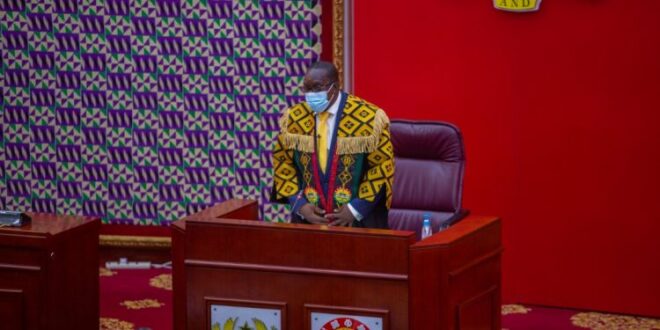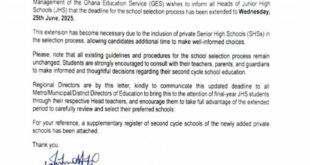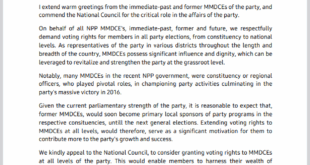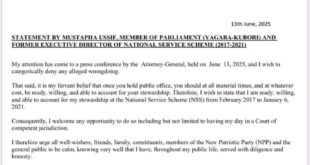Speaker of Parliament Alban Bagbin is calling for increased education of the public about the true mandate of parliamentarians.
According to him, the misconception of the role and functions of parliament has greatly undervalued the role of the legislature in the democratic dispensation of the country and affected the effectiveness of MPs as far as the core business of the chamber is concerned.
Mr Bagbin made the call at the opening of a two-day consultative meeting for West Africa-based Parliamentary Monitoring Organisations in Accra on Tuesday, 15 June 2021.
The workshop, put together by the Ghana Centre for Democratic Development (CDD Ghana), with support from US-based National Democratic Institute, brought together dozens of Parliamentary Monitoring Organisations (PMOs) across the sub-region to deliberate on strengthening PMOs to enhance Parliamentary openness, inclusive policies, transparency and responsiveness.
Delivering his address, Mr Bagbin urged the participants to use the opportunity to chart new paths for advocacy on the role and functions of Parliament.
Below is Mr Bagbin’s full speech
REMARKS BY THE SPECIAL GUEST OF HONOUR, RT. HON. ALBAN SUMANA KINGSFORD BAGBIN, SPEAKER OF PARLIAMENT, AT THE OPENING OF THE WEST AFRICA PARLIAMENTARY MONITORING ORGANIZATIONS’ (PMOs) CONFERENCE ON 15TH JUNE 2021 IN ACCRA
Mr. Chairman
Hon. Members of Parliament present
Representatives of Parliamentary Monitoring Organizations
Executives of the National Democratic Institute
Heads and Representatives of CSOs from other West African countries
Distinguished Invited Guests
Friends from the media
Ladies and gentlemen!
I am indeed greatly honored by the invitation to be the Special Guest of Honor for the maiden West African Parliamentary Monitoring Organizations (PMOs) conference. I would like to express my appreciation to the organizers of the conference, the Ghana Center for Democratic Development (CDD-Ghana) and its collaborating partners – the National Democratic Institute of Washington, Parliamentary Network Africa and the Ghana Network of Parliamentary Monitoring Organizations for this invitation. Let me also take this opportunity to warmly welcome our foreign participants to Accra.
This conference, I am told, is the first stage towards connecting PMOs in West Africa to enable them to share best practices, learn from one another and explore effective ways of engaging Parliaments within their respective countries. I am particularly happy with this initiative, and I trust that discussions during the two-day conference will lead to enhanced ways of strengthening citizens-parliament engagements. Parliaments exist because of the citizens within their jurisdiction. Consequently, Parliaments need to reach out to citizens on constant basis and make them a part of what Parliaments do.
In making these remarks, I wish I could abide by the wise counsel of President Franklin D. Roosevelt on speech-making; To be brief, be sincere, be seated. To be sincere, definitely I will. But to be brief in my remarks and be seated as a special guest of honor, is a rather tall order.
The role of PMOs in sensitizing the citizenry
Mr. Chairman, I cannot but make reference to the challenges that some countries in the West African sub-region such as Mali, Niger and Burkina Faso are currently facing. We must together as a sub-region deal with the emerging issues that confront us because they can have very serious consequences for the people within the sub-region. As legislatures we need to partner CSOs and other forward-looking organizations to assist with educating and sensitizing our citizens on the role they have to play to ensure the growth of democracy, stability and peace in the West African sub-region. I am committed to do just that as one of the key pillars of the Corporate Strategic Plan of Ghana’s Parliament.
The representative role of Parliaments requires the effective communication of the work of Parliament, education of the citizens on the roles and functions of Parliaments, and provision of avenues for the citizens to engage Parliament in policy discussions. Parliament is the supreme forum for the ventilation of grievances aimed at seeking redress. The MP is the communication link between his constituents and government. Through parliamentary mechanisms and tools such as Question Time, Statements, Motions, Petitions, debate on policy or bills among others, Parliament has the opportunity to draw attention of the citizens to developments within the country, explore avenues for the socio-economic growth of the country and carry the citizens along on this agenda. I believe PMOs are strongly positioned to offer support in this regard, to ensure a stronger linkage between what parliaments intend, and what actually manifests on the ground.
In our current context however, the advent of technology and the increasing diversity and availability of information to citizens are pushing Parliaments to compete for the citizens’ attention as never before. Parliamentarians ought to be effective in communicating with, and educating the citizenry on the roles and functions of Parliaments, and to provide avenues for them to engage in policy discussions. Also, the coming into force of the Open Government Partnership (OGP), especially for countries that have signed on to it, has led to a situation in which citizens are demanding greater participation, accountability and responsiveness from Parliamentarians.
There is therefore the need to reach out a lot more to citizens and engage them in parliamentary work. This is an arena that CSOs or PMOs are better positioned to support the efforts of parliaments to engage citizens and to institute procedures that will ensure that the desired impact is being achieved. “It is dangerous to assume either that what has been decided will be achieved, or that what happens is what was intended”, says Brian Loasby, an Economics Professor.
The concept of monitoring of parliaments
Distinguished guests, ladies and gentlemen, at the base of the work of the PMOs is monitoring, which ought to be an embedded concept and an integral part of the work of parliaments. Monitoring should not be seen as an imposed control instrument or a “nice to have”. It is a dialogue on impact and outcome. It is an internal control measure to ensure that outcomes of the work of parliament are achieved, the processes are adhered to, transparency and accountability are assured and most importantly, the understanding and participation of the citizenry in the work of parliament is guaranteed.
As we all know, “what you cannot measure, you cannot monitor.” Monitoring is therefore about setting a standard or target; it is about having the requisite rules, benchmarks, and tools to gather and analyse information about the performance or a set of parliamentary activities while they are ongoing. It is the systematic and routine collection of information from activities for four main purposes:
(1) to appreciate and learn from the activities and experiences, and to improve the practices and activities in future;
(2) to ensure internal and external accountability for the resources deployed and outcomes in such a way that it inures to the benefit of the citizenry;
(3) to make decisions on how to progress with parliamentary work and the level of engagement with the citizens based on empirical evidence and facts, and
(4) to promote empowerment of the citizens with respect to participation in the work of parliament.
Parliaments and PMOs will have to work together to achieve this.
Information and data gathered from monitoring by the PMOs therefore will be used to understand how parliamentary activities are making the desired impact. Definitely the information and data gathered will not be used to find fault but to find a remedy. I am confident that monitoring by the PMOs will focus on the measurement of the following aspects of parliamentary interventions:
(1) the quantity and quality of activities or outputs – what ought to be done and how to manage it;
(2) the outcomes and the effects or changes that occurred as a result of the intervention, and the impact.
(3) It will also look at the broader or long-term effects that were triggered by the activities. This will help provide a standard for success and achievements. Joseph M. Juran, an outstanding writer on management and leadership said: “Without a standard, there is no logical basis for making a decision or taking action.”
Ladies and gentlemen, we all know that monitoring sometimes seem like an unaffordable luxury, an administrative burden, or an unwelcome instrument of external oversight. However, it can be a powerful tool for social and political change. It helps in assessing the difference one can make and provide vital intelligence. It assesses and demonstrates effectiveness in delivering on objectives and impacts whilst improving learning, decision-making, success factors, approaches and removal of barriers.
Monitoring also contributes to empowering and motivating the partners working together on a particular cause, in this case, parliaments and the citizens. It ensures accountability on the part of key stakeholders, contributes to influencing processes, procedures and policies and to the sharing of learnings and best practices. At the end of it all, it is about measurement and control. As H. James Harrington, Chief Executive Officer of the Harrington Institute, said “measurement is the first step that leads to control and eventually to improvement. If you cannot measure something, you cannot understand it. If you cannot understand it, you cannot control it. If you cannot control it, you cannot improve it”.
PMOs and strengthening of parliamentary work
Mr. Chairman, I fully support the objectives of the Parliamentary Monitoring Organisations, given the invaluable ally that they are in the process of strengthening and promoting parliamentary work in West Africa. The monitoring that will be done by PMOs should equip parliaments to provide the required oversight responsibility over the executive arm of government.
I am persuaded that education on the role and functions of parliament is critical if the electorates are to appreciate the value that Parliaments bring to the democratic process. Parliamentarians should not be seen as the main development agents by the citizens. The perceptions and expectations associated with this often leads to the neglect of the core responsibilities of MPs. This perception is highlighted in Afrobarometer’s research findings from Rounds four (4) through to eight. I would therefore like to charge PMOs present here to amplify their collaboration with the legislatures to embark on civic education programs to help reduce this wrong notion and increase the appreciation of the work of the legislature.
I trust this conference will help to give birth to a network of West African PMOs that will be sharing experiences and challenges. I am also confident that this conference will come out with innovative ways of assisting Parliaments to be more inclusive, participatory, open, transparent, accountable and responsive to the citizens. I hope participants will find the conference very useful and provide the needed contributions to the updated research findings discussions to enrich the document and also help to reshape the work of Parliaments in West Africa.
I believe that the achievement of the aims of this conference would help move West African Parliaments further along its quest for good governance and sustained democratic development in the sub-region. I wish you all fruitful deliberations.
I thank you and once again, you are warmly welcome to Accra.
Source: classfmonline.com
Disclaimer: MyGhanaMedia is not responsible for this report and its content.There are four types of content published on MyGhanaMedia daily: curated content; syndicated content; user-generated content; and original content.
Send your news stories to myghanamedia@gmail.com and Chat with us via WhatsApp on +233200818719
 MYGHANAMEDIA.COM Best Source Of Latest News
MYGHANAMEDIA.COM Best Source Of Latest News




